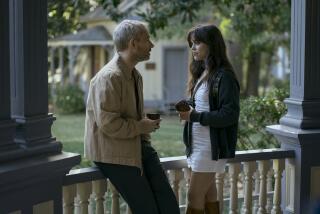MOVIE REVIEW : A Conventional ‘My Girl’ Brings Out the Hankies
- Share via
The syrupy nostalgic score cues us in right away that “My Girl” (citywide) isn’t going to be a lunkhead kiddie romp a la John Hughes. Macaulay Culkin may be the co-star, but he’s a kinder gentler Culkin; a Hallmark card Culkin. No shrieking, no bug-eyed faces.
He actually allows himself to be upstaged by Anna Chlumsky, who plays Vada Sultenfuss, his precocious 11-year-old soul mate. Chlumsky sometimes delivers her lines as if she were reading from a TelePrompTer, but she has spunk; the scenes between Veda and Culkin’s Thomas J. occasionally capture the baffled, cozy mood of pre-adolescent crushes.
Most of the time, however, “My Girl” (rated PG) is wan and conventionally uplifting. It’s about how Veda copes with tragedy, and clearly the filmmakers are sympathetic to her misery, which started at the moment her mother died giving birth to her. Her mortician father (Dan Aykroyd) embalms corpses in the basement of their home and doesn’t quite register her existence. He’s kindly in a distracted, unthinking way; it’s all he can do to survive in his widower’s time warp. Veda develops a crush on a creative-writing teacher (Griffin Dunne)--she wants to be a writer, and even wangles her way into a summer adult’s writing class. She pesters the local doctor with imagined ailments.
But director Howard Zieff and screenwriter Laurice Elehwany don’t cut very deeply into Veda’s misery. The mythical Pennsylvania town where the movie is set is a higgledy-piggledy all-American neighborhood where all the inhabitants are bumpkinish and genial; it’s an idealized view of the sort we’ve been subjected to in the movies almost since the beginning of movies. The soundtrack is clogged with rock ‘n’ roll oldies, which only point up the film’s lack of period flavor. The movie is twinkly and antiseptic so that when tragedy hits big in the final half hour, it seems coercive. It’s like a pipsqueak “Terms of Endearment.” We’re rushed through Veda’s stages of grief on the way to a twinkly denouement.
It’s as if the filmmakers wanted to portray children with genuine depths of feeling but then got cold feet and retreated into the shimmer of sitcom land. If “My Girl” really registered the terror and helplessness children feel when faced with the loss of a loved one, it might have been too strong for the conventional audience it craves--the little fans of Macaulay Culkin, and maybe their parents too. The film may upset that audience anyway; it’s sort of like watching Bambi’s Mom get offed.
Within their limits, the adult actors manage to keep their dignity. Aykroyd demonstrates that his delicate lived-in performance in “Driving Miss Daisy” was no fluke. He gives his character a convincing forlornness, and it’s wonderful to see his joyful emergence when he falls for the morgue beautician (Jamie Lee Curtis). Aykroyd has a few sensitive scenes with Chlumsky; he doesn’t have that condescendingly fake manner that adult actors sometimes indulge in with child performers. And Curtis works well with Aykroyd; she has the measured humor of a woman who coddles her beau’s eccentricities because she recognizes the humaneness underneath.
The mixture of winsomeness and deadpan frights in “My Girl” ought to be weirder and more interesting than it is. After all, a girl who survives a household where bodies are embalmed in the basement is the kind of plucky heroine that movies about kids need right now. Or movies about adults, for that matter.
‘My Girl’
Dan Aykroyd: Harry Sultenfuss
Jamie Lee Curtis: Shelly DeVoto
Macaulay Culkin: Thomas J. Sennett
Anna Chlumsky: Vada Sultenfuss
A Columbia release of a Brian Grazer/Imagine Films Entertainment production. Director Howard Zieff. Producer Brian Grazer. Executive producers Joseph M. Caracciolo and David T. Friendly. Screenplay by Laurice Elehwany. Cinematographer Paul Elliott. Editor Wendy Greene Bricmont. Costumes Karen Patch. Music James Newton Howard. Production design Joseph T. Garrity. Art director Pat Tagliaferro. Running time: 1 hour, 42 minutes.
MPAA-rated PG.
More to Read
Only good movies
Get the Indie Focus newsletter, Mark Olsen's weekly guide to the world of cinema.
You may occasionally receive promotional content from the Los Angeles Times.









